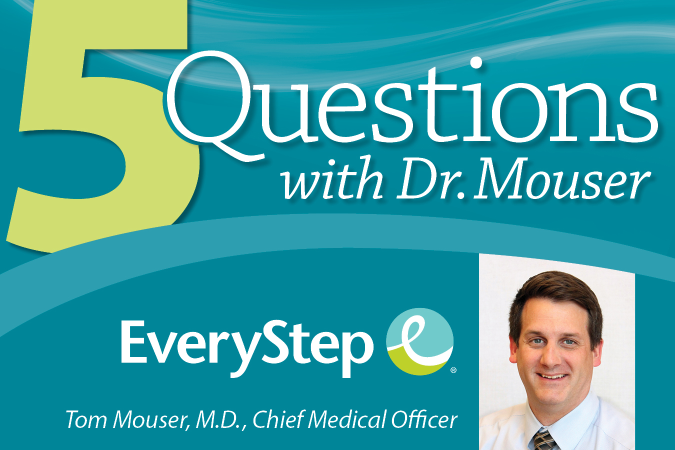July 25, 2023
What is Hospice?

Dr. Thomas Mouser, MD, is chief medical officer with EveryStep. He is dually board certified in internal medicine and palliative care, having completed his residency at University of Iowa – Des Moines and a fellowship at Stanford University. Dr. Mouser has spent countless hours at the bedside of those with serious illness and chronic disease. In his role, he helps hospice and home care patients and their families navigate complex medical decisions as guided by the patient’s goals of care. Dr. Mouser’s fellowship training provided for an expertise in advanced symptom management and communication when working with those with high burdens of suffering. He is passionate about helping his patients reach their best quality of life so they can live life to the fullest.
Q: What exactly is hospice care?
Dr. Mouser: Hospice care is a service [covered] through either Medicare, or often through private insurance, that allows for a high quality, multidisciplinary care team to provide an extra layer of support towards the goal of living a good quality of life. It’s the replacement of aggressive curative treatment for aggressive comfort treatment to help one live to the best quality they can until they die of their illness.
Q: Is there a specific time or situation in which hospice should be considered?
Dr. Mouser: I always tell patients that when they get to the place where they feel they are actually losing out on good living through aggressive curative intent — for instance living in a hospital more than they're living at home, or when they feel they are alive but not living well — that is a time I would highly encourage them to ask somebody about hospice services and if they would qualify. Far too often we hear regrets that people didn't take advantage of hospice services earlier, or waited too long and suffered unduly or just had poor living for a long period of time when hospice would have been able to provide for amplified living.
Q: Does hospice care have to be the result of something like cancer or can other situations qualify you for hospice care?
Dr. Mouser: Historically, we've seen a lot of misunderstanding about that. A lot of cancer patients benefit from hospice, but there are many different reasons that a person may choose hospice care. Any illness that is causing one to decline towards nearing the end of life is an opportunity to take hold of hospice services. When somebody elects hospice, they have typically come to a place where they recognize that aggressive curative intent is not only unlikely to be helpful, but often creates more problems than it solves.
Q: What is the main benefit of hospice?
Dr. Mouser: As we apply aggressive curative treatment to somebody who has incurable disease, we often put them through an awful lot of suffering and discomfort to no avail. As we replace curative intent with aggressive comfort management, we often are able to provide for those comfort services wherever the patient calls home, which helps them stay at home. Ultimately, hospice provides the opportunity to enjoy the best quality of life as one faces the end of life.
When one is seriously ill and is having recurrent hospitalizations, it can become very disorientating and people often begin to feel like they don't have a home base. We often hear when they elect hospice, they have a great sense of relief from simply having a very robust team to help guide and navigate all of that complexity, help explain what's going on and give better detail about opportunities for improvement in symptoms and better living.
Q: How do you start that hospice conversation or to whom do you talk? How do you even begin that process?
Dr. Mouser: Families can reach out directly to the hospice provider and ask for a consultation and evaluation. We certainly would always recommend that you talk with your care team — a nurse, social worker or physician — about a hospice consultation. It's common to have families reach out to EveryStep directly and we’re happy to answer the questions they have at that time.
EveryStep Hospice is Iowa's oldest and largest non-profit, community-based hospice provider. Since launching our hospice program in 1978, thousands of Iowans have turned to us to find comfort and care when they needed it most. You can find EveryStep Hospice programs based in Centerville, Council Bluffs, Des Moines, Mount Ayr, Mount Pleasant, Osceola and Winterset. When a patient needs around-the-clock hospice care, EveryStep Hospice’s Kavanagh House in Des Moines is available. Kavanagh House provides a home-like atmosphere with private bedrooms, living rooms, a family kitchen, spa room, children's play areas and other family amenities. To learn more about EveryStep Hospice, visit https://www.everystep.org/services/hospice.
If you or someone you know is struggling to find the support they need, please contact EveryStep at 515-558-9946. Or complete the commitment-free, confidential “Find Care” form on EveryStep’s website at https://www.everystep.org/find-care. EveryStep staff will follow up with a phone call to answer your questions and provide assistance.